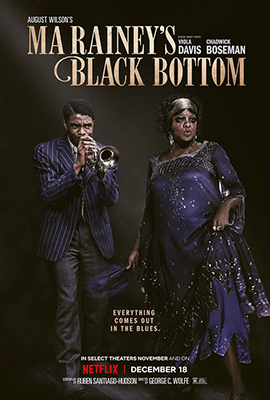As the two tempestuous leads in “Ma Rainey’s Black Bottom,” Viola Davis and Chadwick Boseman give Oscar-worthy performances.
Based on August Wilson’s (“Fences”) play, the film takes place at a recording studio in 1927. At a time when Southern African-Americans migrated North for a better living only to find more oppression, so does “Mother of the Blues” singer Ma Rainey (Davis) find conflict when she leaves Georgia to record her music in Chicago. Her agent (Jeremy Shamos) suggests she change her style of music to the popular arrangements created by her equally headstrong trumpet player Levee (Boseman). Rainey won’t budge, insisting the brand she built remain to be recorded. While Rainey’s power and valued voice allow her to get her way, this creates a stumbling block for Levee, who sees his talent in arranging music and songwriting as the sought-after avenue to become as powerful as Rainey herself. When Levee makes a play for Rainey’s companion and plaything Dussie Mae (Taylour Paige), the aging diva must confront the young upstart in her employ.
Adapted well here by Ruben Santiago-Hudson, August Wilson’s writing is universal and “Black Bottom” could easily serve as another show business parable like “All About Eve” or “A Star is Born.” But by using real-life singer Ma Rainey to accentuate the added layer of confrontation created by skin color, Wilson puts more fuel on the fire. In short, “Black Bottom” is a 94-minute powder keg of a movie that explodes when Davis and Boseman appear onscreen.
For Davis, her portrayal of Rainey shows every bit of the power behind the paunch. With added weight, gold teeth and grease-paint make-up, Rainey seems grotesque at first. But with monologues comparing herself to a prostitute allowing herself to be used by record execs to retain her power or how her music and singing the blues help share a communal life understanding with her audience, Davis makes Rainey a vulnerable rock of determination.
But it’s Boseman, in his final film role, who steals the show. As Levee, Boseman builds a cocky, confident and charismatic exterior. Yet with monologues detailing a childhood tragedy to quell band mates’ accusations of Levee being an ‘Uncle Tom’ to further his career or another where Levee angrily challenges God not to turn His back on him, Boseman shows a bravado that belies a wounded past. Particularly in Levee’s God tirade, with the knowledge of Boseman’s personal battle with cancer, Boseman transcends the material to create a hauntingly bittersweet and emotionally-charged character recklessly running to escape the inescapable.
Deftly directed by George C. Wolfe with music by Grammy-winning jazz artist Branford Marsalis, “Black Bottom” contains all of the elements to create a perfect storm- its rain makes it reign as one of the best films of the year.

